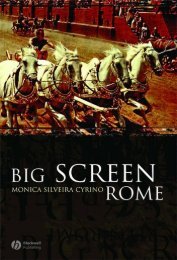Troy From Homer's Iliad to Hollywood Epic - Amazon Web Services
Troy From Homer's Iliad to Hollywood Epic - Amazon Web Services
Troy From Homer's Iliad to Hollywood Epic - Amazon Web Services
Create successful ePaper yourself
Turn your PDF publications into a flip-book with our unique Google optimized e-Paper software.
4 Martin M. Winkler<br />
the industry, for the audience, for all of us – because, as you know, it<br />
sort of connected again <strong>to</strong> a kind of film we hadn’t seen for decades.<br />
It became so successful that all of a sudden these projects were popping<br />
up that dealt with the times of 2,000 years ago – 3,000 years ago, in<br />
our case.” Gladia<strong>to</strong>r inaugurated a veritable renaissance of classical<br />
antiquity on American and European cinema and television screens. 12<br />
In addition, Gladia<strong>to</strong>r revealed more about the spirit of contemporary<br />
America at the beginning of the third millennium a.d. than about the<br />
his<strong>to</strong>ry of the Roman Empire in the second half of the second century.<br />
<strong>Troy</strong> also contains current political and military analogies. 13<br />
The answer <strong>to</strong> the second question is more complex and, for the<br />
context of the present book, more important. On the most basic level,<br />
Petersen is an experienced commercial <strong>Hollywood</strong> direc<strong>to</strong>r whose films<br />
have almost invariably proven successful at the box office. He is also a<br />
highly versatile craftsman in the tradition of the studio direc<strong>to</strong>rs who<br />
had made <strong>Hollywood</strong>’s Golden Age possible. Petersen is at ease directing<br />
films on different subjects in a variety of genres, especially action films,<br />
and has complete mastery of his craft. His craftsmanship almost singlehandedly<br />
revived the flagging careers of Clint Eastwood and Dustin<br />
Hoffman when they starred in his films In the Line of Fire (1993) and<br />
Outbreak (1995). Today, Petersen is one of only a few filmmakers in<br />
<strong>Hollywood</strong> who have final cut on their films, a sign of respect not easily<br />
attained. It is also an achievement that justifies our consideration of<br />
<strong>Troy</strong> as primarily Petersen’s and not Benioff’s or the studio’s product.<br />
While he is not one of the great direc<strong>to</strong>rs who decisively shaped or are<br />
shaping the his<strong>to</strong>ry of cinema as a popular and artistic medium, Petersen<br />
may always be relied on <strong>to</strong> deliver a solid product. Many of his films<br />
reward repeated viewings. If this were not the case, he could not have<br />
12 Works include An<strong>to</strong>ine Fuqua’s King Arthur (2004), written by the principal<br />
screenwriter of Gladia<strong>to</strong>r and despite its title as much a Roman as a medieval film, and<br />
Oliver S<strong>to</strong>ne’s Alexander (2004), both made for the big screen. The small screen preceded<br />
<strong>Troy</strong> with John Kent Harrison’s Helen of <strong>Troy</strong> (2003) and followed it with Imperium: Augustus<br />
and Imperium: Nero (2003–2004), the first installments of an ongoing series, and with<br />
two other multi-part series, Rome and Empire (both 2005). All films were made at considerable<br />
expense and relied on the financial successes of Gladia<strong>to</strong>r, <strong>Troy</strong>, or both.<br />
13 On the cinema as a kind of cultural seismograph in general see my brief comments<br />
in the “Introduction” <strong>to</strong> Classical Myth and Culture in the Cinema, ed. Martin M. Winkler<br />
(New York: Oxford University Press, 2001), 3–22, at 8 (examples there in note 7). On<br />
this aspect of Gladia<strong>to</strong>r in particular cf. Monica S. Cyrino, “Gladia<strong>to</strong>r and Contemporary<br />
American Society,” and Peter S. Rose, “The Politics of Gladia<strong>to</strong>r,” both in Gladia<strong>to</strong>r: Film<br />
and His<strong>to</strong>ry, ed. Martin M. Winkler (Oxford: Blackwell, 2004), 124–149 and 150–172.<br />
Regarding this side of <strong>Troy</strong> cf. Petersen’s comments below.



